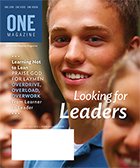
June-July 2014
Looking for Leaders
------------------
|

Overdrive, Overload, Overwork
by Brenda Evans
"Are you okay?" my friend Crystal asked. “You’ve looked unhappy for a couple of weeks.
Is something wrong?”
I avoided the question, of course, said I was fine, hemmed a little about this, hawed a little about that, and finally admitted the truth. “My brain’s a muddle, Crystal. Too many things on my agenda,” I said.
Agenda. Our elevated word for a plain old to-do list. I use it all the time. A lot of us do. Agenda raises our busyness to importance, I suppose. Then I told Crystal my crazy to-do list for the next three months.
“I’ve done it to myself,” I said, “should have said no to a lot of it.” Crystal listened without harping. She knew that I knew the problem—me. I was overworked by choice. Me…a 71-year-old retiree with options! I don’t have to work 100 hours a week to ease my company’s annual crunch time or juggle overtime to keep my job. I have no company. I have no job. Sometimes, I simply choose to overwork. To terribly misquote the pompous Malvolio in Shakespeare’s Twelfth Night: “Some are born overworked, some achieve overwork, and some have overwork thrust upon them.”
I do occasionally have overwork thrust upon me, but, truth is, mostly I achieve overwork because I choose it. According to a poll by Right Management of Milwaukee, so do others. Two-thirds of the 325 in the poll admitted they are putting in much longer hours than they did five years ago. A 2008 Harvard Business School survey of a thousand professionals found that almost half worked in excess of 65 hours a week. Last October, Goldman Sachs issued new guidelines to their junior investment-banking analysts: on average they should not work more than 70 to 75 hours a week.
The question is why do we overwork? Financial columnist James Surowiecki thinks it’s because of money since overwork is “a credential of prosperity.” I agree that we do a lot of things for money and overwork is certainly one of them, especially for those who bill by the hour or get extra pay for overtime. But for me, neither money nor necessity is the reason.

A couple of weeks after my conversation with Crystal, another friend sent an email to ask me to take on a new project for a Christian organization where I regularly volunteer. This time, I typed up that same to-do list, asked to be excused from the project, and pressed the send button.
She answered that same day. “No problem,” she said before adding a big verbal pat on the back about how grateful she was for all I already do and how well I do it. She not only let me off the hook, she also stroked my ego. That’s why I say overwork is not always about necessity or money. Ego incentivizes us as well.
Now don’t think I’m using the word ego in the most negative sense of its meaning. I simply mean the self, the I, the person I am, who has worth and value to myself and to others. That “self” wants and needs validation and commendation. Work is often the place we look for that stamp of approval, the credential giving us a pass, acceptance, status, putting us into the organization’s inner circle. We want to be inside, awe our boss, be important. These are strong incentives. So, we make work a proving ground, and the test or “proving” is long hours.
According to Anne Vandermey of Fortune magazine, those 75-hour-per-week junior analysts consider Goldman Sachs the ultimate career destination. Bonus checks don’t hurt, they say, but “above all else, it’s the opportunity to work with, and count yourself among, an ultra-elite group. Less than 3% of 97,600 applicants for analyst and associate roles won a seat at the firm last year, making it twice as hard to get into as Harvard.” Ambition, attainment, and status win the day for a lot of us.
A desire to be in the “inner ring,” as C. S. Lewis described it, is one of the mainsprings of a person’s life and often is about power, money, toughness, superiority, even a cover for personal problems. And so, as Lewis says, we take on extra work to climb inside: we stay late, work long hours, take on more projects (that’s me). Anything to be inside rather than outside. The unhappy irony is that our climbing can plunge us pell-mell into struggles, dissatisfaction, even depression. Lewis compares this desire to an onion. We pierce through one ring and get inside the onion, but we only find another ring, then yet another. Finally, Lewis warns, “Unless you take measures to prevent it, this desire is going to be one of the chief motives of your life, from the first day on which you enter your profession until the day when you are too old to care.”
Why should we avoid overworking regularly? On a practical level, overwork decreases competency and productivity, whether physical or cognitive. Both body and brain tire and work less efficiently, less safely.
Beyond that, overwork shows disproportion in our lives. The current buzz phrase is “keep a work-life balance.” But it’s not balance so much as proportion that keeps me in right relation with the truly important things: God, family, rest, study, reinvigoration. When these are in good proportion, I stay sound and undamaged.
In physics, proportional limit or yield point is the stress level at which a material begins to deform plastically, that is, irreversibly. Before yield point, the material will deform elastically but return to its original shape when stress is removed. Once yield point is passed, however, deformation is permanent.
Staying this side of our proportional limit or yield point means we stay elastic, resilient, and supple. We may get bent, twisted, and folded, but not permanently mutilated. Going beyond the proportional limit—long-term overwork in other words—tends to fracture, even deform us into someone or something that we don’t want to be to our family and our Lord.
I do love opportunities. I like to write, speak, teach, lead a committee, join yet another book club or writing group, but I have recently vowed to be more discerning. Maybe I like work too much because I like being inside, being wanted, being a part of things. I must learn to say no, be more guarded, and more wise.
My recent tension and exhaustion brought me back to what the Lord says in Jeremiah 6:16 and, ultimately, brought me to make a vow: “Stand at the crossroads, look, and ask for the everlasting path, the way of the good that leads to good, and walk in it.” That’s my paraphrase, of course, but these imperatives of the Lord have helped me re-establish my feet on “the way of the good that leads to good” and to a vow not to overwork.
Of course, work itself is not the problem. God has commissioned us to work (Genesis 2:15). It is a privilege, a mandate, and also one of the ways we are made in the Lord’s image: He is a doing, making, creating God. Work is also one of the many favors He has conferred on us human beings. Can you imagine a cat’s life, lying around most of the day, purring, licking your paws, grooming your fur, scratching away at the threads of your owner’s new sofa, and only occasionally catching a mouse?
No, work is not the problem. Why I overwork is the problem. My vow is to manage my work under the Lord’s imperatives so that my work does not manage me.
About the Writer: Brenda Evans is a retired English teacher. She and her husband Bill (former director of the Free Will Baptist Foundation) live in Catlettsburg, Kentucky. They are proud grandparents of seven.
|
|

